|
Printables |
PowerPoints |
Online exercises |
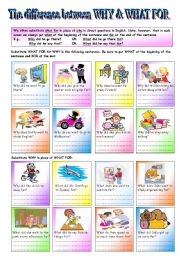
|
The Difference between WHY & WHAT FOR - When, why & how to use WHY & WHAT FOR - elementary - (( B&W VERSION INCLUDED ))
We often substitute WHAT FOR in place of WHY in direct questions in English. This worksheet focusses on teaching students the difference between the use of WHY and WHAT FOR. There is an exercise where students substitute WHAT FOR for WHY and WHY in place of WHAT FOR in sentences. The Black & White version is also included. Hope you find it useful. ...
Level: elementary
Age: 7-17
Type: worksheet
Downloads: 157
|
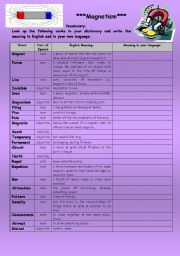
|
Magnetism - (( 4 pages )) - Teaching language through Science - elementary to intermediate - editable
This unit of work is developed to teach language through Science. It focusses on: Parts of Speech (adjectives, nouns, verbs, adverbs),vocabulary, dictionary work, grouping words, completing sentences using correct form, writing meaningful sentences. It�s good for intermediate level students generally aged between 12 and 18 years. Hope you find it u...
Level: intermediate
Age: 7-17
Type: worksheet
Downloads: 34
|
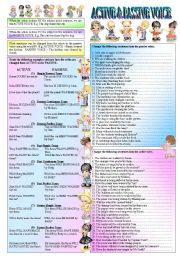
|
ACTIVE & PASSIVE VOICE - Teach your students "When, Why & How" to form active & passive sentences with 8 different verb tenses - (( definitions & 60 sentences )) - elementary/intermediate - (( B&W VERSION INCLUDED ))
This worksheet focusses on teaching students "when, why & how" to form active & passive sentences with the following verbs: present simple, present continuous, present perfect, past simple, past continuous, past perfect, future simple, future perfect. All definitions with examples as well as 60 sentences for your students to complete are included. ...
Level: elementary
Age: 7-17
Type: worksheet
Downloads: 729
|
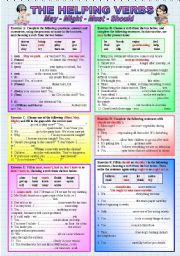
|
�HELPING VERBS/MODALS� - MAY - MIGHT - MUST - SHOULD - (( 6 Exercises & 58 Exercises to complete )) - elementary/intermediate - (( B&W VERSION INCLUDED ))
This worksheet focuses on the Helping Verbs MAY - MIGHT - MUST - SHOULD. There are 6 exercises with 58 sentences for your students to complete. The worksheet includes the following tasks:
1) Exercise A: Complete the following questions, answers and statements, using the pronoun or name in the brackets, and choosing a verb from the box.
2) Exerc...
Level: elementary
Age: 7-17
Type: worksheet
Downloads: 477
|
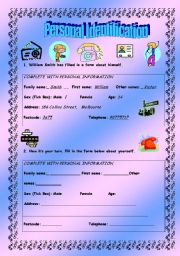
|
Personal Identification - elementary - (( 4 pages )) - Editable
ESL students will often be in situations where they are required to give personal information, both orally and in writing. This unit is designed to prepare students for the task of giving basic personal information, especially in more formal situations, and when filling in forms. Grammar focus: nouns, verbs, adjective, vocabulary. This unit is edit...
Level: elementary
Age: 5-17
Type: worksheet
Downloads: 38
|
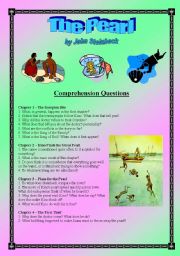
|
The Pearl by John Steinbeck - (( 16 pages )) - comprehensive unit of work - intermediate - editable
This unit was developed using the "Penguin Reader" Factsheet as a base adding my own twist to it. It includes the following: comprehension, dictionary work, vocabulary, description words, reference words, parts of speech: nouns, verbs, adjectives, adverbs, cloze activities, true/false sentences, regular/irregular verbs, chronological order, matchin...
Level: intermediate
Age: 10-17
Type: worksheet
Downloads: 27
|
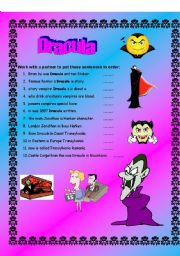
|
Dracula - (( Grammar )) elementary to intermediate - (( 8 Pages )) - Editable
This unit was developed to teach English Language through the "Dracula" film or book. It includes: pronouns, prepositions, relative pronouns, direct/indirect reported speech, putting sentences into correct order, comprehension, Dracula Internet Assignment and it is also editable. Hope you find it useful. Cheers.
Level: elementary
Age: 6-17
Type: worksheet
Downloads: 54
|
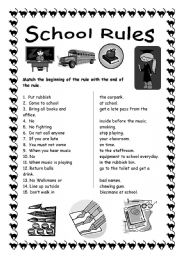
|
"School & Classroom Rules" - (( 3 pages )) - elementary - Black & White
This worksheet focusses on 3 areas: School Rules, Classroom Rules & Finding way around our school, which can be adapted acording to the school you�re at. It includes: matching beginning of rule with the end of rule, cloze activity, true/false questions, matching first part of sentence with second part. I have also uploaded a black & white copy if y...
Level: elementary
Age: 7-17
Type: worksheet
Downloads: 84
|
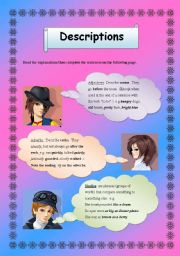
|
"Descriptions" - (( 2 Pages )) - Adjectives/Adverbs/Smilies - elementary - editable
This worksheet focusses on teaching English Language through the topic of "Descriptions". It includes adjectives, adverbs and similies with cloze activities. Hope you find it useful. Cheers.
Level: elementary
Age: 8-17
Type: worksheet
Downloads: 17
|
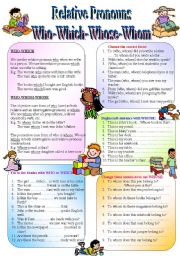
|
Relative Pronouns - When to use "Who-Which-Whose-Whom" - elementary/intermediate - (( definition & 38 exercises )) - (( B&W VERSION INCLUDED ))
We use the relative pronoun who when we refer to a person. We use the relative pronoun which when we refer to a thing. The objective case form of who (used as both relative and an interrogative pronoun) is whom. We use whom after all prepositions, a direct object of a verb, etc. This worksheets focusses on teaching students "when, why & how" to use...
Level: elementary
Age: 5-17
Type: worksheet
Downloads: 473
|
|
|
|
|